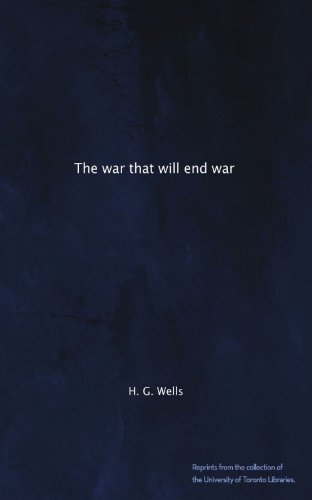by Michael Hofferber. Copyright © 1996 All rights reserved.
The 11th of November marks the anniversary of the end of hostilities on the Western Front in World War I, which took effect on "the eleventh hour of the eleventh day of the eleventh month" of 1918. An armistice signed in a railway carriage in the Compiègne Forest of France between the Allies and Germany initiated a cessation of hostilities that had claimed over 60 million lives.
British author H. G. Wells referred to the conflict as "The War That Will End War" in London newspapers as early as 1914 and the catchphrase referring to World War I as "the war to end war" continued for almost a generation.
While World War II and threats of global annihilation during the Cold War seemed to make a mockery of Wells' prediction, from today's perspective he was spot on. World War II is widely viewed by historians as a continuation of the earlier conflict, caused by nationalistic tensions, unresolved issues, and resentments resulting from World War I.
"For many years Europe has been an armed camp, with millions of men continually under arms, with the fear of war universally poisoning its life, with its education impoverished, its social development retarded, with everything pinched but its equipment for war," Wells observed in 1916.
The conflict that began in Europe and spread around the globe during the ensuing half a century not only altered political maps, but pretty much brought an end to monarchy as a system of government. And while many dictatorships rose up to fill the void, most have since been deposed and democracy has spread dramatically.
In the book "The Better Angels of Our Nature: Why Violence Has Declined," Steven Pinker documents a steep decline in wars worldwide since the mid-20th century, complemented by a equally precipitous rise in education and democratic governance. Contrary to the impression made by contemporary mass media, the actual number of battle deaths between warring nations has fallen off dramatically along with the number of wars, military coups, and deadly ethnic riots across the globe.
The first "world" war created an awareness of an interconnected "world community" for the first time, a change in consciousness accentuated by the global threats of the Cold War and the photographs of a lonely Earth against a backdrop of empty space brought back by Moon-walking astronauts. Bitter conflicts and terrible violence continue, without doubt, but the nature of war has changed. The benefits of a peaceful coexistence, both financial and social, are better recognized than ever before. The more educated we become and the more of a stake we have in our governance, the less inclined we are to wage war.
The veterans of the 20th century's conflicts should be celebrated, consequently, for their role in preserving civilization, advancing democracy and bringing an end to war.


